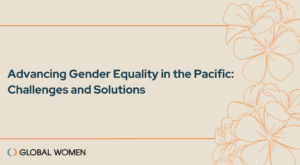“Gender equality is crucial for economic growth and development in the Pacific,” say Global Women member Amanda Ellis and The Moana Tasi Project Founder Naima Te Maile Fifita (J.D.).
From inequitable employment opportunities, to lack of childcare options, to personal safety concerns, systemic barriers continue to disenfranchise women from participating in economic growth and development across the Pacific region. In their recent article responding to the World Bank’s Women, Business and the Law 2024 index, Ellis and Fifita outline the tangible steps that can be taken to close the gender gap across the Pacific.
While it has been proven that the presence of women in leadership across governing bodies is important for the move towards gender equality globally, it has only been in the past decade that women have been represented across all Pacific governing bodies. Excluding Australia and New Zealand, the region’s first female head of government, Hilda Heine, was elected in the Republic of the Marshall Islands in 2016, followed by Fiamē Naomi Mata’afa in Samoa in 2021.
“Outside of Australia and New Zealand, every Pacific Islands Forum member country is below the global average for laws and policy affecting women’s economic opportunities,” say Ellis and Fifita, “while laws across the region aren’t doing enough to protect women from violence and harassment.”
Laws that secure equal remuneration for women and men performing work of equal value only exist in Kiribati and the Marshall Islands. Additionally, legislation that limits when and where women can work can be found across the Pacific region, often resulting in women working in lower paying jobs or in informal arrangements without protections. A widespread lack of access to childcare further excludes women from the labour market. Ellis and Fifita point to Australia and New Zealand’s implementation of childcare legislation as effective models for the region, where only three nations currently legislate for the provision of centre-based childcare services.
Gendered violence is also prevalent. With the exception of Kiribati, which comprehensively prohibits all forms of domestic violence, sexual violence and child marriage, legislation protecting women is applied unevenly across the region. Some nations that do protect against domestic violence exclude economic violence from their legislation. Sexual violence is absent from the domestic violence laws of others, and, in addition to Kiribati, only Fiji and Samoa have laws against sexual harassment in employment. Fiji also protects against sexual harassment in public spaces and educational institutions, and comprehensively prohibits child marriage.
Though law reformation and the presence of women in governance advocating for change are crucial first steps towards change, Ellis and Fifita highlight the importance of a coordinated effort from all to break down the systemic barriers that are hindering progress.
“The journey toward gender equality in the Pacific requires not only legal reforms,” say Ellis and Fifita, “but also a broader commitment to transforming the attitudes and structures that have long held women back from participating and contributing to their societies on an equitable basis with men, for the benefit of all.”
For more information, click through to read Amanda Ellis and Naima Te Maile Fifita (J.D.)’s full article ”Progress isn’t moving fast enough for women in the Pacific”.
